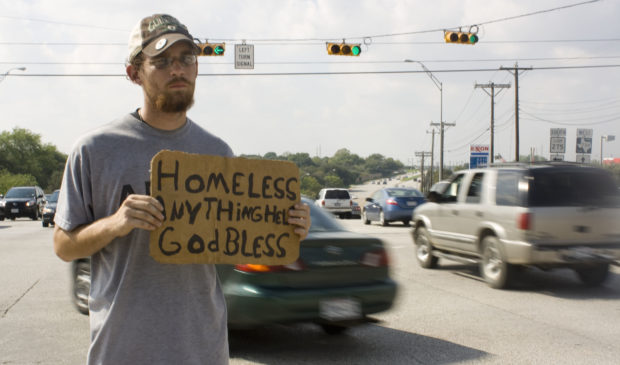Possible changes to panhandling ordinance draw concern from business leaders
Tuesday, July 3, 2018 by
Chad Swiatecki A possible revision of the city’s ordinance regulating panhandling is drawing concern from downtown business leaders who say the proposed changes would allow aggressive requests for money and could create safety issues in areas with heavy foot traffic.
The amendments to the city’s solicitation ordinance had been on the agenda for Thursday’s City Council meeting, but the item was withdrawn last week so city staff could gather more public input on the new language. The city’s Public Information Office said there is no schedule or timeline for when the changes will go before the public or be put back on a future meeting agenda.
The amendments came about because the city auditor found in a November report on issues related to homelessness that “ordinances that limit or ban camping, sitting or lying down in public spaces, and panhandling may create barriers for people as they attempt to exit homelessness because they can lead to a criminal record or arrest warrants.”
The audit further found that encounters relating to those ordinances generated 18,000 citations between Fiscal Year 2013-14 and FY 2015-16, with about 90 percent of those citations failing to appear in court and 72 percent of those cases resulting in an arrest warrant that created another barrier to escaping homelessness.
The audit’s recommendations included reviewing those ordinances for possible repeal or revision, while also providing case management services to those cited and examining ways to reduce the number of arrest warrants issued and the jail time served.
Draft language amends the areas where panhandling is prohibited by reducing the number of public areas that are off-limits for monetary solicitation, making sidewalks, streets, highways, parks, alleyways and pedestrian ways areas where the practice would no longer be against city code. Aggressive panhandling would be prohibited in any “publicly accessible” area, but specific areas such as crosswalks or areas across the street from a school property with minors in attendance are no longer explicitly spelled out as being disallowed.
The Downtown Austin Alliance, which represents downtown property owners and businesses, has voiced opposition to the draft language.
Bill Brice, DAA’s vice president of operations, said even though recent court rulings have granted panhandling as an expression of free speech, the expansion of allowable areas and redefinition of “aggressive panhandling” are likely to make pedestrians feel less safe.
“What’s been removed in the draft is a lot of the language that defines what counts as ‘aggressive,’ and this would in effect allow what’s currently considered aggressive panhandling in public,” he said. “This is about trying to provide public safety in an environment where people might already not feel safe.”
Brice said the effectiveness of the current ordinance comes mostly from the ability of Austin Police Department officers to threaten a citation to offenders, who typically stop soliciting when warned with the possibility of being charged with a class C misdemeanor. Making it harder for officers to issue those citations, he said, would reduce the effectiveness of trying to limit panhandling that does cross the line.
Brice also pushes back against the conventional wisdom that all panhandlers are homeless, and said that while downtown areas would see an increase in pedestrians being followed and harassed for money, it is likely all areas of the city would gradually be affected by the change.
“It’s important to separate the two issues and the idea that panhandling is always about homelessness,” he said. “This should be about preventing unlawful behavior. We want to preserve the ability for people to utilize free speech and be able to ask for money. We feel this can be tightened up while also addressing a public need.”
Photo by The Accent made available through a Creative Commons license.
The Austin Monitor’s work is made possible by donations from the community. Though our reporting covers donors from time to time, we are careful to keep business and editorial efforts separate while maintaining transparency. A complete list of donors is available here, and our code of ethics is explained here.
You're a community leader
And we’re honored you look to us for serious, in-depth news. You know a strong community needs local and dedicated watchdog reporting. We’re here for you and that won’t change. Now will you take the powerful next step and support our nonprofit news organization?









